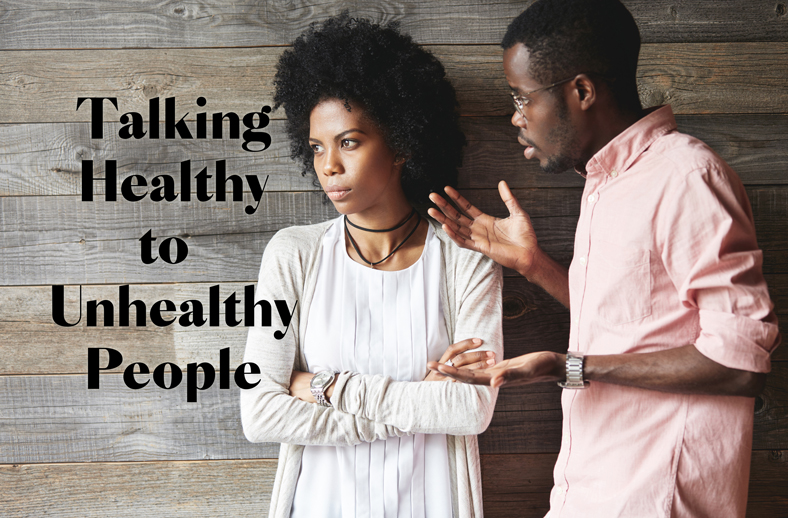How to improve your communications skills in challenging situations.
By Lisa Hawkins
I’ve had to deal with unhealthy communicators for most of my life. At some point, my brain decided that I must be the problem. While others seemed to get validation for the games they played and how poorly they communicated, I was born to seek clarity, and, as a result, I became the black sheep. However, instead of letting it pull me down, it fueled my desire to turn healthy communication into a career.
One day, I realized that I’d done everything possible to encourage clarity and understanding in my interactions with others, yet some of my family members and coworkers just weren’t invested in better communications. Some days, I wanted to jump off a proverbial bridge to get some kind of separation from these maddening situations. Over time, I realized that it was stressful trying to clarify and communicate clearly with people who have an invested interest in misunderstanding me to promote their own agendas, so I learned to let go of the outcomes.
I realized that when you show up in an unhealthy environment with healthy talk, people will get angry. They will see you as a threat because their stories are being challenged, and, whether they consciously know it or not, they are kicking back because you aren’t playing the games they have set up.
When you find yourself in a similar situation, use your wonderful critical thinking skills to see it for what it is: You are not the problem. It takes the ability to step out of your emotions around the exchange and reflect on them to see the stories others are creating. Of course, there are lessons for you as well. Rather than trying harder to get your points across, step back and become a third-party observer. Keep in mind that your point of view is not being rejected for a rational reason—you are being rejected because you have shown up with a healthy perspective. For the dynamics to change, others must shift and deal with their stories being challenged—and most people are not willing to do that.
I know it’s stressful! I do! Some days, I’d rather chew off my arm than deal with these situations. Remember that you can’t change others. It’s also helpful to have the support of healthy people who understand you, and to learn to be your own best friend. Next, ground yourself and snap back into your own reality or perspective when you are challenged. The stronger you are, the less you will shrink energetically when confronted with individuals or groups that have unhealthy communication styles and stories. Tell yourself, “I am not the issue. They aren’t willing to step outside of their lines of reasoning and learn a better way.”
Shrinking down energetically means you feel smaller. The moment you feel inferior, the moment you feel wounded by a situation, others can sense it, and it makes it easier for them to chip away at you. If you look at successful people, you will notice that they stand up and become rock solid within themselves when challenged, and this is how they use each brick thrown at them to build a castle. This takes time and a lot of self-reflection. It takes a great deal of self-talk to build yourself up, rather than allow self-doubt to prevail.
Here are some common beliefs that will perpetuate covert aggression:
- Here it is again. This keeps happening to me.
- It’s got to be me. I’m the common denominator.
- I can’t take this anymore. I need to get out of here.
- I’m so frustrated I could die.
And some emotional states that will keep you stuck in a negative feedback loop:
- Staying in confusion.
- Allowing it to wound you.
- Residing in perpetual worry.
- Feeling inferior.
- Engaging in and listening to gossip or negative talk.
This last one was a tremendous step for me in understanding that I needed to walk off once I said something if there was no positive feedback or active listening going on. This is a powerful tool.
Utilizing conscious communication and nonverbal gestures, such as standing strong to balance out the drama, helped me greatly on my own journey. I’ve learned how to stand up straight and communicate by looking people in the eye. Like everything in life, it’s a path of discovery with learning along the way.
Here’s to better understanding!
Lisa Hawkins is a coach with 26 years of experience in personal growth and development, psychology and human behavior with an emphasis on relationships, which includes the most important one, with yourself. She helps those who want to have a more fulfilling relationship and life. When one works on one aspect of life that is holding them back, it trickles down to other areas of life. Love is the one thing we all crave at a deep level: We crave our true nature, our self-love, and to express that love to others. Lisa works with men and women to awaken the conscious part of themselves that knows how to love deeply. Find our more at http://www.ConsciouslyAwakeCounseling.com or on Facebook at https://www.facebook.com/ConsciouslyAwakeCoun/





